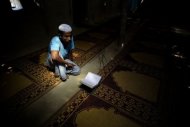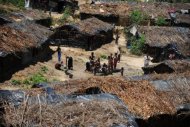Bangladesh has launched a crackdown on groups smuggling economic migrants and ethnic Rohingya refugees out of the country to Malaysia, via a perilous and sometimes fatal sea crossing.
According to police, dozens of wooden boats overloaded with Rohingyas and Bangladeshi migrants, have attempted the approximately 3,200 kilometre (2,000 mile) journey since the monsoon rains ended in October.
Last week a boat carrying 120 people -- mostly ethnic Rohingyas -- capsized in the Bay of Bengal, said Colonel Zahid Hasan of the Border Guards of Bangladesh (BGB).
"Some 100 people have survived, we learned from fishermen, but the rest are missing and presumed drowned," he told AFP.
Since the accident, a series of BGB raids in the southeast coastal towns of Teknaf and Sabrum, which border Myanmar and host a large population of Rohingya refugees, have prevented a number of boats from illegally setting sail.
Described by the United Nations as one of the most persecuted minorities on earth, thousands of Muslim Rohingyas -- who are not recognised as citizens in Myanmar -- stream across the border into Muslim-majority Bangladesh every year.
Bangladesh recognises 28,000 of them as registered refugees, who live in two official UN camps near the border. This figure is a fraction of the 200,000 to 300,000 "unofficial" refugees, according to government estimates.
The Rohingyas are driven by a sense of "utter frustration" to attempt the boat trip to Malaysia, said Mojibur Rahman, a registered refugee at the UN's Kutupalong refugee camp.
"For many, the risky sea journey is better than the squalor and near starvation in the refugee camps in Bangladesh. A lot of Rohingyas know that the trip is like suicide. But do they have any choice?," he told AFP.
Bangladesh stopped a UN-managed program to help Rohingya refugees resettle in third countries last year, said Rahman, who estimated that at least 3,000 Rohingyas had embarked on the sea crossing to Malaysia since late October.
They have been joined by a large number of impoverished Bangladeshis living in southeast coastal villages, who see Malaysia as their best -- and closest -- opportunity for carving out a new life.
The vast majority hope to secure unregistered work as manual labourers on construction sites.
"Traffickers charge only around 20,000 taka ($300) for a boat ride to Malaysia, which is at least 15 times cheaper than the migration fees being charged by recruiting agencies," said Teknaf police chief Mahbubul Haq.
Earlier this year, Malaysia announced an amnesty for more than half a million Bangladeshi illegal migrants.
The deal was only valid for two weeks in July, but still triggered a surge in the number of people willing to risk the sea crossing.
Nearly 200 people -- half of them Rohingyas -- have been arrested and some 10 boats seized since the latest wave of migration began in early November, Haq said.
"We have put undercover agents along the border. They are tipping us off to any moves by traffickers to get Rohingyas and Bangladeshis into the boats to attempt the journey.
"But I am afraid many boats may have evaded our crackdown and set sail anyway," he said.
As well as the threat of capsize and drowning, the migrants also risk arrest and imprisonment by the Thai authorities, if their boats stray into Thai waters.
In January 2009, the Thai authorities were accused of seizing boats laden with Rohingya refugees, towing them back out to sea and abandoning them.
Allegations of mistreatment surfaced after nearly 650 Rohingya were rescued off India and Indonesia, some claiming to have been beaten by Thai soldiers before being set adrift.


No comments:
Post a Comment